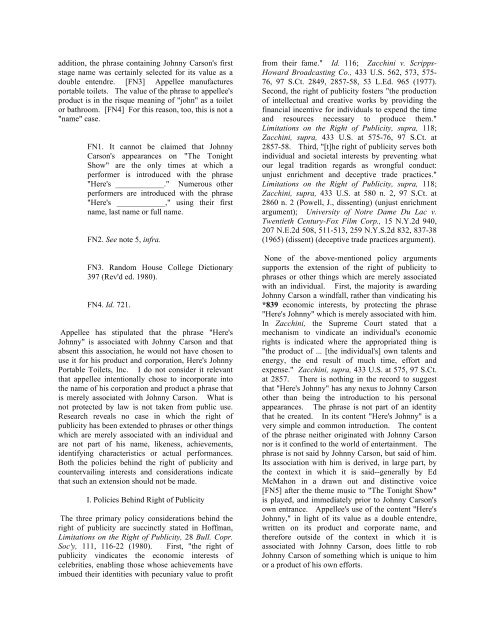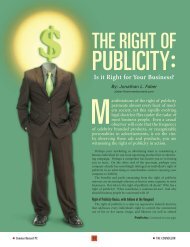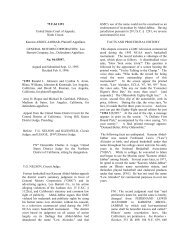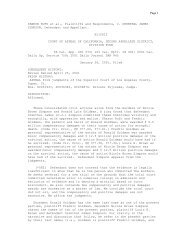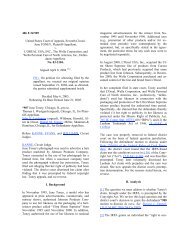Johnny Carson v. Here's Johnny Portable Toilets ... - Right Of Publicity
Johnny Carson v. Here's Johnny Portable Toilets ... - Right Of Publicity
Johnny Carson v. Here's Johnny Portable Toilets ... - Right Of Publicity
Create successful ePaper yourself
Turn your PDF publications into a flip-book with our unique Google optimized e-Paper software.
addition, the phrase containing <strong>Johnny</strong> <strong>Carson</strong>'s firststage name was certainly selected for its value as adouble entendre. [FN3] Appellee manufacturesportable toilets. The value of the phrase to appellee'sproduct is in the risque meaning of "john" as a toiletor bathroom. [FN4] For this reason, too, this is not a"name" case.FN1. It cannot be claimed that <strong>Johnny</strong><strong>Carson</strong>'s appearances on "The TonightShow" are the only times at which aperformer is introduced with the phrase"<strong>Here's</strong> ____________." Numerous otherperformers are introduced with the phrase"<strong>Here's</strong> ____________," using their firstname, last name or full name.FN2. See note 5, infra.FN3. Random House College Dictionary397 (Rev'd ed. 1980).FN4. Id. 721.Appellee has stipulated that the phrase "<strong>Here's</strong><strong>Johnny</strong>" is associated with <strong>Johnny</strong> <strong>Carson</strong> and thatabsent this association, he would not have chosen touse it for his product and corporation, <strong>Here's</strong> <strong>Johnny</strong><strong>Portable</strong> <strong>Toilets</strong>, Inc. I do not consider it relevantthat appellee intentionally chose to incorporate intothe name of his corporation and product a phrase thatis merely associated with <strong>Johnny</strong> <strong>Carson</strong>. What isnot protected by law is not taken from public use.Research reveals no case in which the right ofpublicity has been extended to phrases or other thingswhich are merely associated with an individual andare not part of his name, likeness, achievements,identifying characteristics or actual performances.Both the policies behind the right of publicity andcountervailing interests and considerations indicatethat such an extension should not be made.I. Policies Behind <strong>Right</strong> of <strong>Publicity</strong>The three primary policy considerations behind theright of publicity are succinctly stated in Hoffman,Limitations on the <strong>Right</strong> of <strong>Publicity</strong>, 28 Bull. Copr.Soc'y, 111, 116-22 (1980). First, "the right ofpublicity vindicates the economic interests ofcelebrities, enabling those whose achievements haveimbued their identities with pecuniary value to profitfrom their fame." Id. 116; Zacchini v. Scripps-Howard Broadcasting Co., 433 U.S. 562, 573, 575-76, 97 S.Ct. 2849, 2857-58, 53 L.Ed. 965 (1977).Second, the right of publicity fosters "the productionof intellectual and creative works by providing thefinancial incentive for individuals to expend the timeand resources necessary to produce them."Limitations on the <strong>Right</strong> of <strong>Publicity</strong>, supra, 118;Zacchini, supra, 433 U.S. at 575-76, 97 S.Ct. at2857-58. Third, "[t]he right of publicity serves bothindividual and societal interests by preventing whatour legal tradition regards as wrongful conduct:unjust enrichment and deceptive trade practices."Limitations on the <strong>Right</strong> of <strong>Publicity</strong>, supra, 118;Zacchini, supra, 433 U.S. at 580 n. 2, 97 S.Ct. at2860 n. 2 (Powell, J., dissenting) (unjust enrichmentargument); University of Notre Dame Du Lac v.Twentieth Century-Fox Film Corp., 15 N.Y.2d 940,207 N.E.2d 508, 511-513, 259 N.Y.S.2d 832, 837-38(1965) (dissent) (deceptive trade practices argument).None of the above-mentioned policy argumentssupports the extension of the right of publicity tophrases or other things which are merely associatedwith an individual. First, the majority is awarding<strong>Johnny</strong> <strong>Carson</strong> a windfall, rather than vindicating his*839 economic interests, by protecting the phrase"<strong>Here's</strong> <strong>Johnny</strong>" which is merely associated with him.In Zacchini, the Supreme Court stated that amechanism to vindicate an individual's economicrights is indicated where the appropriated thing is"the product of ... [the individual's] own talents andenergy, the end result of much time, effort andexpense." Zacchini, supra, 433 U.S. at 575, 97 S.Ct.at 2857. There is nothing in the record to suggestthat "<strong>Here's</strong> <strong>Johnny</strong>" has any nexus to <strong>Johnny</strong> <strong>Carson</strong>other than being the introduction to his personalappearances. The phrase is not part of an identitythat he created. In its content "<strong>Here's</strong> <strong>Johnny</strong>" is avery simple and common introduction. The contentof the phrase neither originated with <strong>Johnny</strong> <strong>Carson</strong>nor is it confined to the world of entertainment. Thephrase is not said by <strong>Johnny</strong> <strong>Carson</strong>, but said of him.Its association with him is derived, in large part, bythe context in which it is said--generally by EdMcMahon in a drawn out and distinctive voice[FN5] after the theme music to "The Tonight Show"is played, and immediately prior to <strong>Johnny</strong> <strong>Carson</strong>'sown entrance. Appellee's use of the content "<strong>Here's</strong><strong>Johnny</strong>," in light of its value as a double entendre,written on its product and corporate name, andtherefore outside of the context in which it isassociated with <strong>Johnny</strong> <strong>Carson</strong>, does little to rob<strong>Johnny</strong> <strong>Carson</strong> of something which is unique to himor a product of his own efforts.


